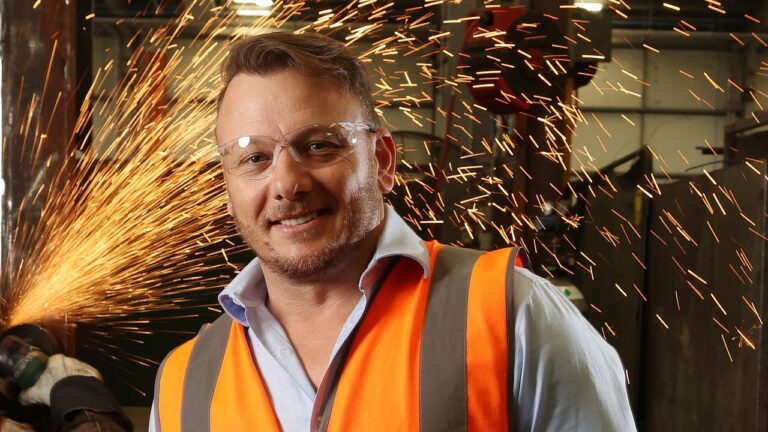
As a professional rock musician Gavin Dunwoodie knew how to lay down a beat.
Now the bass guitarist is in another groove as head of rapidly expanding Brisbane automation manufacturer PFI, which stands for Products For Industry.
The company, founded by Mr Dunwoodie from his Inala home in 2005, will soon crack $100m in sales, with a workforce in excess of 300 people. The Darra-based firm has effectively doubled in size in three years buoyed by a pandemic-related manufacturing boom.
Mr Dunwoodie said strained international supply chains due to the pandemic had made it prohibitive to import large pieces of equipment to Australia.
That had provided a boon for PFI that makes everything from automated grain handlers and abattoir conveyor belts to supermarket warehouse packaging systems.
“If there is a capacity to make it in Australia, there is a good chance we are being asked to build it,” Mr Dunwoodie said. “I am very surprised at how fast the business has grown and it has accelerated due to Covid. Supply chain issues and the cost of logistics has changed significantly and that has helped open up Australian manufacturing overnight.”
Almost two years ago, PFI moved into a huge new factory at Darra where hundreds of workers are employed in roles ranging from metal workers and boilermakers to engineers and designers. He said that there are now plans to open a new factory in Sydney to handle the increasing amount of orders from around the country.
“The company is on the verge of doubling again,” he said. “We are about to put on another 50 people across a range of roles.”
He said Australian companies were realising following the pandemic that they had to bring manufacturing and logistics closer to home and make their operations more efficient.
As an example, PFI was working with supermarket chains on installing automation at some of the biggest distribution centres in the southern hemisphere.
“They are investing in automation to provide a better service,” he said. “Instead of paying a person to go and grab items for a pallet of groceries, automated picking systems using cranes are being employed so there is virtually no human contact.”
Mr Dunwoodie said that given the emphasis on food security following the pandemic, PFI also was providing an increasing amount of equipment to agriculture including the grain and beef industries. PFI is currently building a fleet of automatic grain handlers for GrainCorp that will work on farms around the country to collect harvests.
Mr Dunwoodie said the resurgence in Australian manufacturing thanks to Covid-19 hopefully would be sustained in the years to come.
“The challenge is to maintain it and not go back to our old ways,” he said. “We don’t want to return to procuring products for the lowest price and being hopeful of quality. We need to keep the momentum and that will take continued investment from the companies themselves.” Ai Group said there had been a stronger interest in Australian-made products due to overseas stock shortages, freight delays, and disruptions.
Some manufacturers, wholesalers, and distributors say their suppliers are thinking about ‘reshoring’ their production activities back to Australia due to ongoing disruptions to global supply chains and freight services.
This is particularly evident in traditional ‘heavy industrial’ manufacturing sectors such as metal products and machinery manufacturing, but also in chemicals, building materials, wood and furniture.
Mr Dunwoodie said the manufacturing sector continued to facing challenges including inflation and shortage of electronic components including computer chips. “This is a huge issue for us because there are a lot of chips in this equipment,” Mr Dunwoodie said.
He said that while he had been surprised by the growth of his business, it had taken a lot of commitment from both him and his staff.
“The business has always retained its profits,” he said. “Every time a business takes a cent out it limits its opportunities going forward and I have never done that. I haven’t taken any dividends in 20 years and that’s why it’s blown up.”
PFI is now looking to expand into the export market with a new range of products. In one corner of its factory, a screened off area is devoted to the trial of a new proprietary water purification system using titanium membranes.
Mr Dunwoodie said the water produced by the process is so clean that it had attracted interest from Scottish whiskey producers. Mr Dunwoodie said that despite his success as an industrialist, he remain a musician at heart. “I lived in Ballarat for most of my life where music is really big and have played in a range of bands,” he said.
His home is filled with musical instruments played by him and his teenage daughters. “My whole house is nothing but guitars,” he said. “The girls play bass, piano and also sing.”